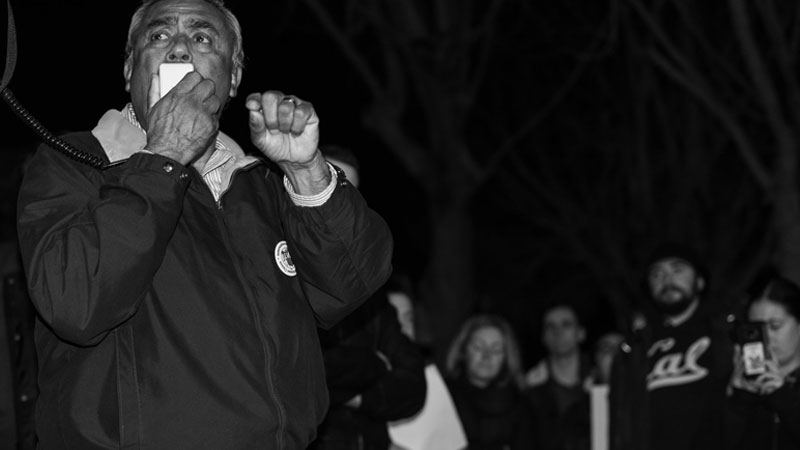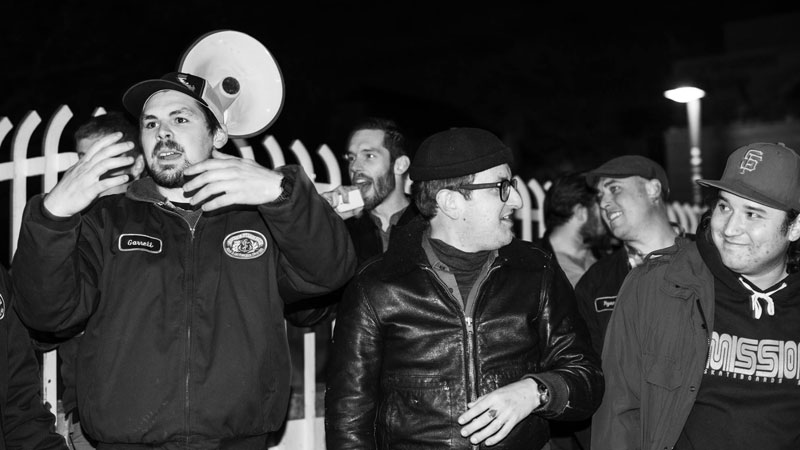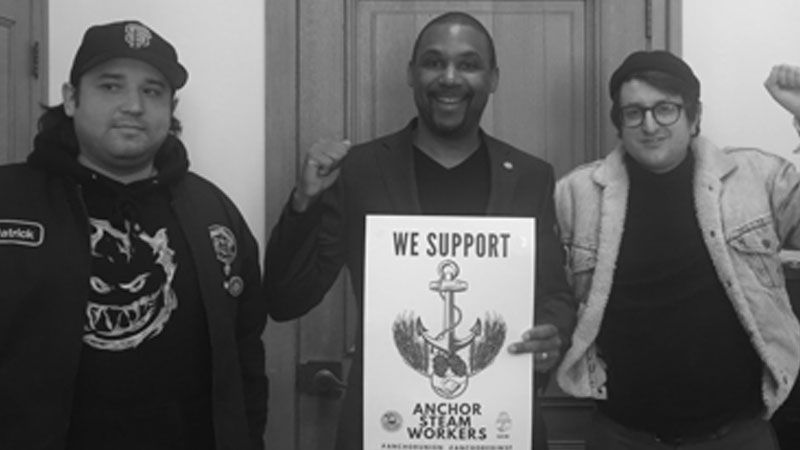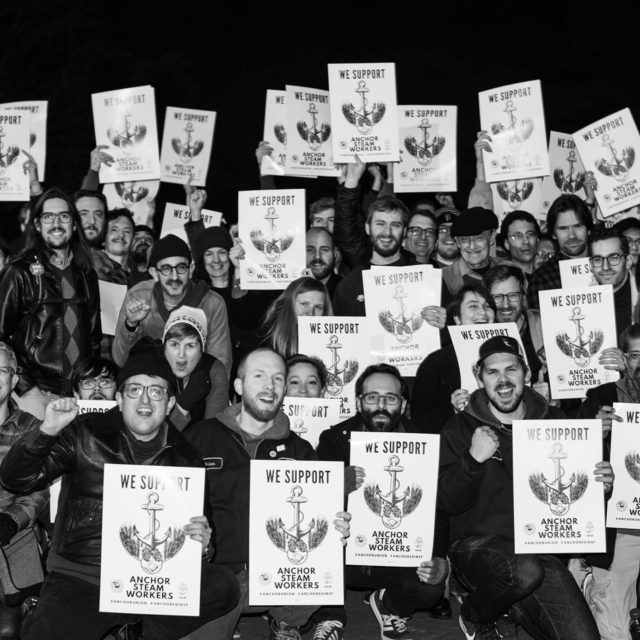On Wednesday, March 13, 2019, Anchor Brewing officially unionized. In doing so, it joins a relatively short list of breweries with union members, including Busch, Budweiser, Miller, and Coors.
“Large-scale macro-breweries are union and have been for some time,” Garrett Kelly, a full-time fermentation worker at Anchor, says. “Smaller-scale craft breweries, virtually none of those are union.”
Based in San Francisco, and often considered America’s first craft brewery, Anchor was purchased by Tokyo-based Sapporo Holdings in 2017. Under Sapporo’s “corporatization,” Anchor employees have reported unlivable wages, reduced benefits, and fear that their families — as well as production of their beloved Anchor Steam beer — will be priced out of San Francisco.
As a union, Anchor begins the fight for better quality of life for its employees. But its organizers’ cries for higher wages, better benefits, and more control echo beyond Anchor’s walls. According to the Bureau of Labor Statistics, craft brewery workers’ wages declined by 25 percent from 2006 to 2016. With 7,000 breweries in the U.S. and counting, that’s a lot of slashed paychecks.
Anchor’s next moves could set a crucial example for a changing industry.
Why Unionize?
Where many breweries that “sell out” to large brewing corporations claim doing so improves their products as well as the lives of their employees, Anchor staffers say the opposite was true.
Last year, Sapporo reported a 4.4 billion yen ($39.8 million) “impairment loss” on the Anchor acquisition. As a result, the company reduced wages and contributions to employee healthcare plans.
“They cut sick time in half. They made it abundantly clear they had no intention to make things better for workers. Rather, they continue to make it worse,” Kelly tells VinePair. He has worked at Anchor for three years. Even employees’ “shift beer,” a common clock-out privilege at breweries, was reportedly eliminated.

Kelly says he’s able to “scrape by” on $18.35 an hour, a wage that adds up to $36,700 a year. “I feel every penny I spend,” he told Mission Local. “There are times when I have to ask whether I’m buying groceries or paying the phone bill.”
According to the Council for Community and Economic Research, the total cost of living in San Francisco is 62.6 percent higher than the U.S. average, and rental rates are the highest in the country. Median monthly rent costs $4,650 for a two-bedroom apartment.
As a result, employees are taking on as many as three jobs outside the brewery and are moving out of San Francisco to Bay Area suburbs, stretching their pay checks and commutes.
Part-time workers earn $16.50 an hour and are limited to 29-hour work weeks. This prevents them from being eligible for health benefits. It’s also considered below a living wage in San Francisco.

On Feb. 19, 2019, San Francisco Supervisor Shamann Walton wrote a letter to Sapporo USA and Anchor Brewing COO Greg Newbrough on behalf of Anchor workers. It announced employees’ intention to form a labor union affiliated with the International Longshore and Warehouse Union (ILWU), which represents Bay Area warehouse workers.
According to Kelly, organizing efforts had been in the works for more than a year. “Management,” he says, was not agreeable. “They’ve been running a pretty strong anti-union campaign.”
(VinePair reached out to both Sapporo and Anchor for comment. After three requests for comment from Anchor’s PR team between Feb. 8 and March 13, 2019, VinePair received the following response: “When we have something to say, we will be in touch.” A Sapporo spokesperson said Anchor’s PR team “is handling requests regarding Anchor and Sapporo.”)
Unionizing can often be a political power struggle between middle-class workers and upper management. Anchor partnered with the ILWU through the San Francisco chapter of the Democratic Socialists of America, of which several Anchor union organizers are members. “There’s a real uptick in class consciousness and labor activism, and we’re thrilled to be a part of that,” Kelly says.
A Movement in Motion
It all came to a head when Anchor employees voted in favor of unionizing on March 13, celebrating a 31-t0-16 victory. The brewery is now a unit of ILWU Local 6. A second election on Friday, March 15, 2019 determined that Anchor’s satellite location, Anchor Public Taps, will also unionize. It emerged victorious with a 6-to-2 vote with one challenge.

Barring any irregularities (which, Kelly says, are unlikely), the National Labor Relations Board will certify the votes later this week. Anchor will then elect a bargaining committee to begin contract negotiations.
“Bargaining could take as long as a year, but we’re hopeful management will honor their promise to us to negotiate in good faith and not delay proceedings,” Kelly says.“It’s a grassroots, ground-up organizing campaign by and for the workers of the brewery. I’m thrilled we’re going to have a seat at the bargaining table and have say in determining our future.”
‘The Stage Is Set’
According to the Utility Workers Union of America (UWUA), union workers earn 20 percent more income than non-union workers. Union members are more likely to see regular pay raises and have pensions, and children of union workers will earn an average of 16 percent more than their parents, a 2015 study showed.
As the beer industry continues to expand, and more breweries merge or sell to survive, Anchor is providing a new solution: Under the umbrella of a union, a craft brewery can conceivably be owned by a multinational corporation and still give its employees a seat at the bargaining table. If Anchor succeeds, and improves employees’ work and living conditions while keeping its brand afloat, craft unions could become a viable option for smaller breweries seeking to support staff and manage profitable businesses.
“The response we’ve gotten from the community, the press, and workers in the craft beer industry have been overwhelmingly positive,” Kelly says. “The stage is set for this to grow into a larger movement bigger than us here at Anchor.”
